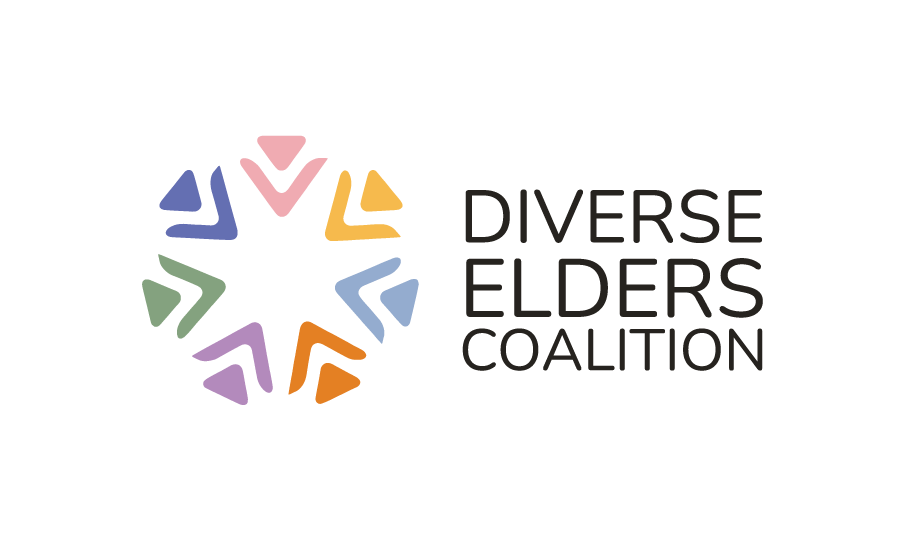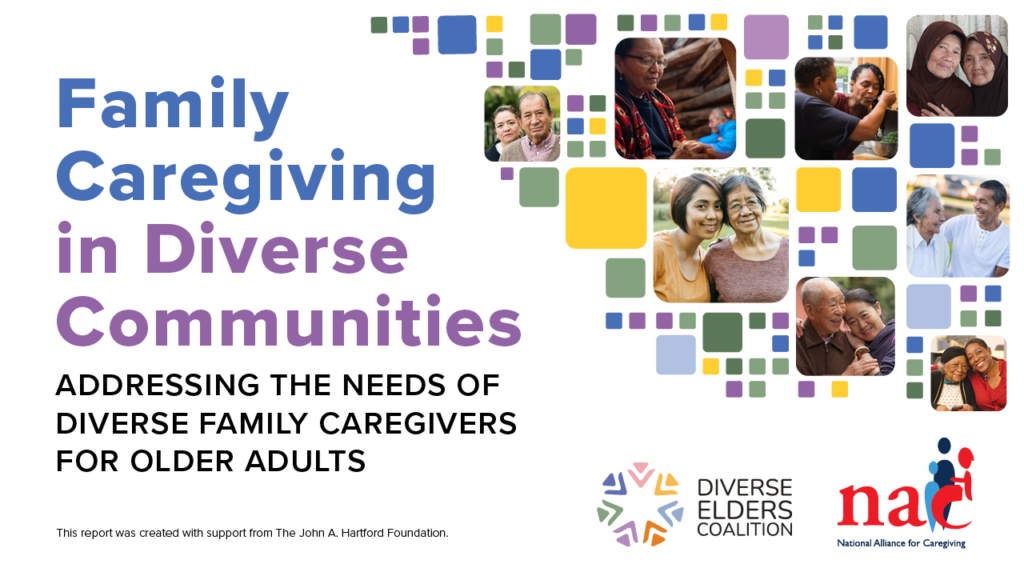Analysis Reveals How Diverse Family Caregivers of Older Adults in the United States were Impacted During the Pandemic
A new report from the Diverse Elders Coalition and its members, and in partnership with the National Alliance for Caregiving, calls for policies to support family caregivers in the U.S. that address systemic inequities.
The report entitled, “Family Caregiving in Diverse Communities: Addressing the Needs of Diverse Family Caregivers for Older Adults” focuses on understanding the lived experiences of family caregivers who support older adults from the DEC’s constituent communities, including racially and ethnically diverse people; American Indians and Alaska Natives; and lesbian, gay, bisexual, transgender and queer/questioning (LGBTQ+) people.
“The fact that lawmakers and policymakers are starting to recognize the important roles and needs of caregivers is a meaningful step forward for the older adults we work with,” said Lauren Pongan, National Director of the Diverse Elders Coalition. “It’s our hope that, in crafting caregiving-related policies, lawmakers will continue to listen and be responsive to caregivers’ lived experiences and perspectives–especially racially and ethnically diverse, American Indians and Alaska Natives, and LGBTQ+ caregivers.”

Based on research from the Diverse Elders Coalition, its members, and the National Alliance for Caregiving, this report highlights key findings from diverse caregivers for older adults throughout the COVID-19 pandemic. Key themes that have emerged include a lack of resources to adequately and culturally responsively address caregivers’ mental health, social isolation, and financial strain. The report also highlights protective factors or the ways in which our communities exercise resilience in spite of the pandemic and other inequities.

Finally, recommendations are brought together for how to integrate these findings into the landscape of national caregiving policy that is being developed, including implementation of the Recognize, Assist, Include, Support, and Engage (RAISE) Family Caregivers Act. The goal of this report is to offer research and recommendations to ensure systems of services and supports for caregivers intentionally address health disparities and systemic barriers that diverse family caregivers for older adults face.
“The pandemic has had a disproportionate impact on diverse communities in many ways and this analysis adds more context to how that impact has been felt by families,” said Michael R. Wittke, Vice President for Research and Advocacy at the National Alliance for Caregiving. “Caregivers of older adults especially were already in a state of crisis in many instances and will still need a robust support system beyond the pandemic. Now is the time to establish a national strategy that is aimed at addressing the needs of caregivers in a way that reduces systemic barriers.”
Highlights
Mental Health and Social Isolation
Top Challenges: Anxiety (58%) and increased isolation (56%)
Top Concern: “Taking care of myself” (56%)
Desired Services: Emotional Support (43%)
Financial Strain
Top Challenges: Financial Strain (35%)
Top Concern: “Preparing for the future financially” (54%)
Desired Services: Financial Help (43%)
Protective Factors
Diverse family caregivers also reported experiencing some positive outcomes from the COVID-19 pandemic, demonstrating resilience and community interdependence rather than a reliance on formal support services:
Spent More Time With Family (55%)
Decreased Commute Times (48%)
Learned or used new technology (44%)
Although protective factors reveal resiliency and unity among diverse caregivers during the pandemic, they also emphasize the need for providers and formal institutions to more effectively provide much-needed mental health and financial assistance to improve the quality of life of caregivers and ultimately their aging loved ones.
Policy Recommendations
The findings and recommendations in this report can inform and be interwoven into the following priority areas that support the development and execution of various actions that must be taken to better serve diverse communities. The following priorities align with the priorities outlined by the federal R.A.I.S.E Family Caregiving Advisory Council housed under the U.S. Department of Health and Human Services, Administration for Community Living.
Priority Area 1: Increased awareness of LGBTQ+ caregivers, tribal caregivers, as well as caregivers from other diverse communities, including targeted education defining who is eligible for services.
Priority Area 2: Increased emphasis on integrating caregivers considered “family of choice”, immigrant caregivers, Limited English Proficient (LEP) caregivers, caregivers from the same tribe, and long-distance caregivers into processes and systems from which they have been traditionally excluded.
Priority Area 3: Increased access to services and supports to assist family caregivers by including and investing into more resources to overcome language and cultural barriers and prioritize providing translated resources, services, and information.
Priority Area 4: Increased financial and workplace protections for caregivers with a specific focus on preparing to care for the future, future finances, and financial education.
Priority Area 5: Better and more consistent research and data collection facilitated through partnerships with CBOs who have established community trust with the aim of increased participation in research studies, like caregiving surveys or focus groups.
Get the Report
To read our report, Family Caregiving in Diverse Communities: Addressing the Needs of Diverse Family Caregivers for Older Adults, visit https://bit.ly/DECNACCaregivingReport2021.
To read a summary of the report visit https://bit.ly/DECNACCaregivingFactSheet2021.
About This Report
In the creation of Family Caregiving in Diverse Communities: Addressing the Needs of Diverse Family Caregivers for Older Adults, the Diverse Elders Coalition and the National Alliance for Caregiving utilized the help of experts in the field of caregiving and diverse family caregivers, including DEC member groups NAPCA, NCBA, NHCOA, NICOA, SAGE and SEARAC, the Benjamin Rose Institute on Aging, Bernadette Wright at Meaningful Evidence, LLC., over 300 caregivers who shared their time and experience and 18 stakeholders who guided in the creation of DEC’s curriculum to improve the capacities of providers serving diverse caregivers and older adults. This report was made possible with generous funding by The John A. Hartford Foundation.
About the Diverse Elders Coalition

The Diverse Elders Coalition (DEC) advocates for policies and programs that improve aging in our communities as racially and ethnically diverse people; American Indians and Alaska Natives; and lesbian, gay, bisexual, and/or transgender people. We envision a world where all older adults can live full and active lives as they age.
Together, we are made up of six national organizations representing a growing majority of millions of older people throughout the country:
· National Asian Pacific Center on Aging
· National Caucus and Center on Black Aging
· National Hispanic Council on Aging
· National Indian Council on Aging
· SAGE
· Southeast Asia Resource Action Center
About the National Alliance for Caregiving

The National Alliance for Caregiving’s mission is to build partnerships in research, advocacy, and innovation to make life better for family caregivers. Our work aims to support a society that values, supports and empowers family caregivers to thrive at home, work, and life. As a 501(c)(3) charitable non-profit organization based in Washington, D.C., we represent a coalition of more than 60 non-profit, corporate, and academic organizations; nearly 40 family support researchers with expertise in pediatric to adult care to geriatric care; and more than 50 advocates who work on national, state, and local platforms to support caregivers across the United States. In addition to our national work, NAC leads and participates in several global meetings on caregiving and long-term care, working closely with peer organizations in countries such as Australia, Canada, Denmark, Finland, France, Hong Kong, India and Nepal, Ireland, Israel, Japan, New Zealand, Sweden, Taiwan, and the United Kingdom.

